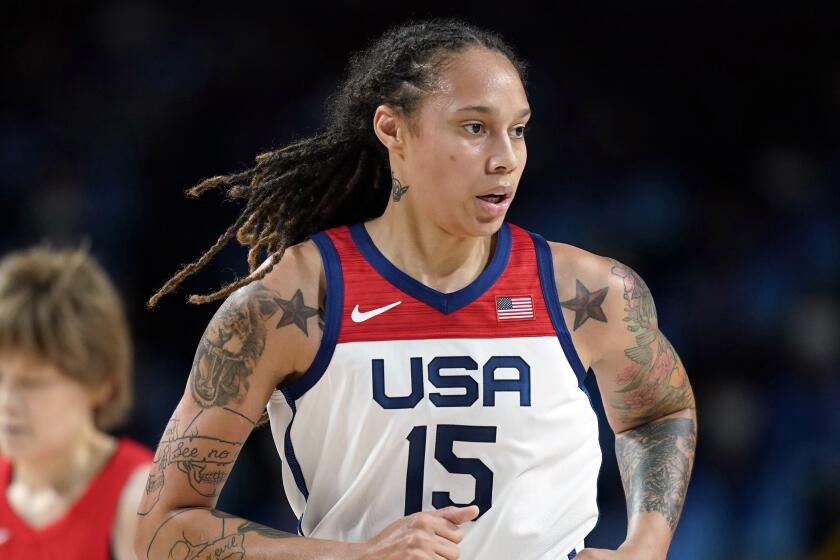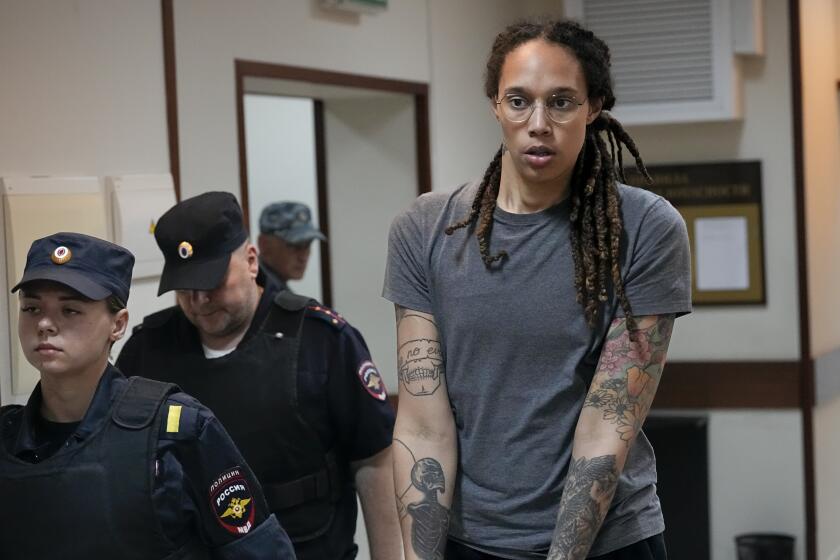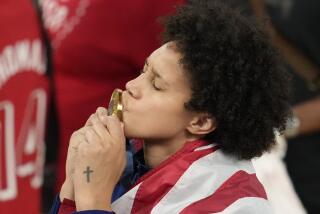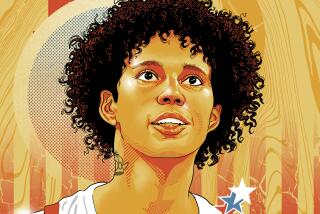What’s next for Brittney Griner? Experts discuss a road to recovery

- Share via
Brittney Griner returned to U.S. soil under a dark sky with the red glow of airplane lights illuminating her first steps at home.
The brief, blurry four-second video of Griner’s return Friday morning marked the end of one ordeal for the WNBA star but the beginning of another one.
After 294 days in Russian custody, Griner returned to the United States last week following a high-profile prisoner swap. The WNBA star’s homecoming was met with joy and relief from her supporters as she was reunited with her wife, Cherelle, in San Antonio, where Griner was slated to undergo evaluation at Brooke Army Medical Center. Those assessments regarding Griner’s physical, mental and emotional state were just the first step in an uncertain path for the two-time Olympic gold medalist.
“This is a long-term recovery,” said Paul R. Abramson, a professor of psychology at UCLA who has worked with victims of wrongful detainment.
Griner’s extended incarceration in Russia puts her at risk for complex post-traumatic stress disorder, two psychology experts said. While PTSD stems from a single traumatic event, complex PTSD is marked by continued coercive control.
Survivors of repeated child sexual abuse or domestic violence, prisoners of war and refugees often suffer from complex PTSD. The reaction incorporates PTSD’s involuntary re-experiencing of a traumatic event, avoidance of triggers and hypervigilance with intense reactions that manifest in physical symptoms like insomnia, headaches and upset stomach.
“When you have one incident, you have a whole trail of traumatic consequences, but when the events are repeated, the consequences are not additive, they are multiplicative,” said Priscilla Dass-Brailsford, a clinical psychologist and an associate professor of psychiatry at Georgetown University who’s an expert in trauma recovery. “So it’s harder and the therapy becomes very long-term.”
Plaschke: An American is coming home. So why are so many Americans upset Brittney Griner is free?
Brittney Griner’s release from Russia in a high-profile prisoner exchange should be celebrated, not disparaged by reactions reeking of bias and bigotry.
Griner’s identity as a Black, queer woman and mistreatment she received in Russia add layers that must be addressed as she recovers from her experience, said Dass-Brailsford, whose research focuses on how people from historically oppressed groups manage stress. Needing to approach each piece of Griner’s identity individually and collectively makes psychological treatment even more complicated.
For trauma survivors, Dass-Brailsford recommends first restoring a sense of safety and promoting self-care. She avoids asking them to recount their experience immediately so as to not risk repeating trauma. Instead, Dass-Brailsford focuses on what they can expect next.
Trauma survivors often experience a range of emotions over months and years: everything from joy, disbelief, shock, anxiety, guilt, anger and depression. Understanding what could happen, preparing for the challenges and normalizing every feeling are positive steps.
“Whatever facilitates stability, seek it,” Abramson said. “You want to go back to your life, go back to play basketball, go back to whatever you’re doing, so you fill your time with productive things and find the strength within you.”
Dass-Brailsford encourages patients recovering from trauma to rediscover routines. For Griner, a return to basketball could be a positive step to restoring self-esteem and confidence, the psychologist added.

The 32-year-old WNBA champion averaged 20.5 points and a career-high 9.5 rebounds in 2021, the same year she helped the United States to its seventh consecutive Olympic gold medal. But when asked about Griner’s future last week, WNBA commissioner Cathy Engelbert stressed the importance of patience.
“We’re going to respect the privacy of this very critical time in her coming back home,” Engelbert said Thursday, hours after the news of Griner’s release was confirmed. “Obviously I’d love to call her, I’d love to see her, we’re going to give her the appropriate space and time for that. And then follow what Brittney and her family want to do about re-engaging with the WNBA and our players. I know our players are very anxious to re-engage and reunite with Brittney as well. So we’ll follow the players’ lead.”
Mercury forward Brianna Turner helped lead her team’s calls for Griner’s safe return and wrote on Twitter that hearing of her teammate’s release was the “BEST NEWS EVER.” With Griner’s safety guaranteed, any questions about whether she could return to the court were secondary.
“BG is so much more than a athlete,” Turner wrote in a separate tweet. “The primary concern is making sure her mental health is progressing and she’s able to recover from the past 294 days. She could never step foot on a court again and I will still support her relentlessly.”
Granderson: Brittney Griner was a great start. How about freeing the 35 men at Guantánamo Bay?
The U.S. has a chance to show moral leadership to back up its appeals to governments that are holding Americans unjustly.
Since Griner’s arrest in February, support from the WNBA community never wavered. Players wore shirts reading “We Are BG” and sweatshirts with Griner’s likeness. Courts were emblazoned with Griner’s initials and jersey number 42. Players, coaches and fans wrote her thousands of letters.
After counting the days on Twitter, supporters rejoiced when Griner was shown boarding a charter plane bound for the United States. Wearing a red and black plaid flannel shirt and knit cap covering her shortened hair in the video released by Russian state media, Griner was asked about her mood.
“Happy,” she said with a nod and a smile.
Through her research and practice, Dass-Brailsford has encountered people who have lived through civil war, poverty and abuse. She still finds many survivors can smile in the end just like Griner did, giving her optimism in the resilience of the human spirit.
“Support, that is a primary ingredient in recovery, and she has it already,” Dass-Brailsford said. “She seems to have a very loving wife so that’s another key ingredient in recovery. So will she become resilient? I would bet yes.”
More to Read
Go beyond the scoreboard
Get the latest on L.A.'s teams in the daily Sports Report newsletter.
You may occasionally receive promotional content from the Los Angeles Times.













